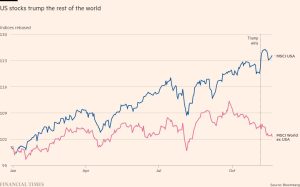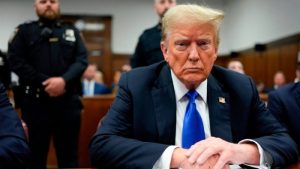Australian businesses complain they are ‘public enemy number one’
Unlock the Editor’s Digest for free
Roula Khalaf, Editor of the FT, selects her favourite stories in this weekly newsletter.
The Australian government has inflamed relations with the country’s businesses as it tries to tackle rising costs of living by taking action against supermarkets, entertainment promoters and financial service providers.
In recent weeks, the government has unveiled plans for steeper fines against supermarkets engaging in anti-competitive behaviour, as well as bans on surcharges for digital payments made by debit card users, “dynamic” pricing of concert tickets and other “rip-off” practices in digital transactions such as hidden fees and automatic subscription renewals by gyms.
Business leaders have expressed alarm that the Labor government has adopted an increasingly populist position ahead of a general election due in May. “I’d hesitate to call it a war on business, but there is a clear shift in thinking to make it ‘public enemy number one’,” said Innes Willox, chief executive of the Australian Industry Group, which represents businesses. “In the public domain the government — and to an extent the opposition — have earmarked business as the big bad wolf that they should try to demonise.”
With annual inflation at 3.8 per cent, the government says the moves are driven by a desire to ease the cost of living. “We are coming at this inflation challenge from every conceivable, every responsible angle,” Jim Chalmers, Australia’s treasurer, told the Financial Times. “Our highest priority is easing inflation and the cost of living at the same time as we build a more competitive, more dynamic and more productive economy.”
Just two years ago, Prime Minister Anthony Albanese took office to applause from the business community as he sought to restore relations with China, Australia’s largest trading partner, and held a jobs and skills summit to tackle the country’s crippling labour shortage.
Since then, the mood has soured, initially at least because of industrial relations reforms that have strengthened the hands of unions in wage negotiations and elevated the rights and pay of contract workers.
The problem for the Labor government, said Mark Kenny, a professor at the Australian National University’s Australia Studies Institute, is that it is caught between increasingly populist anti-business strains on all sides of the political spectrum.
The traditionally pro-business Liberal party has reframed itself as the “party of the worker”, arguing that Labor represents an “inner-city elite”. Peter Dutton, the Liberal leader, has railed against “woke” corporate leaders and, alongside its junior partner the rural National party, has proposed breaking up the country’s supermarkets and other large retailers to crack down on price “gouging”. Some of its MPs also flirted with a push to break up airline Qantas.
The minority Greens have proposed a “Robin Hood tax” of 40 per cent on companies making “excessive profits” in the mining, energy, banking and retail sectors. “It’s time to make the big corporations and billionaires pay their fair share of tax,” its leader Adam Bandt said in August.
Labor’s push to ban dynamic pricing of concert tickets needs to be seen in that political context, Kenny said. “It’s an example of a lever that doesn’t do much but needs to be pulled,” he said.
With a survey by the Australia Institute’s Carmichael Centre and Centre for Future Work finding that 83 per cent of respondents blamed supermarkets for the soaring cost of living, there is a clear incentive for the government to take action. “There’s likely to be political rewards for taking actions that increase supermarket competition,” said Lisa Heap, senior researcher at the institute.
The growing alarm at the anti-business rhetoric building into next year’s election was voiced by Matt Comyn, chief executive of Australia’s largest bank CBA, at a Senate committee in August to address concerns around surcharges on digital payments.
He expressed frustration that a “false dichotomy” was emerging in Australia that any profit made by a company was “somehow being unjustly extracted from consumers” and that “fact-free rhetoric” was starting to erode trust in the country’s institutions.
In a sign of the growing disconnect between Canberra and the country’s largest companies, Albanese has been berated at consecutive industry gala dinners.
Tania Constable, head of the Minerals Council of Australia, which represents the mining industry, warned the prime minister that the sector felt under siege as a result of costly workplace reforms. “Undermine it at your peril,” she told delegates including Albanese at an event last month.
The annual Business Council of Australia dinner two weeks later proved just as uncomfortable for Albanese, who sat in a room full of some of the country’s most powerful business leaders.
“An attack on businesses — big or small — is an attack on all Australians,” said Bran Black, chief executive of the BCA, who said that many business leaders felt the country was “losing our way”.
The rise in anti-business rhetoric was a distraction from the real issues facing Australia, Black later told the FT. The lack of a cogent long-term economic plan from any political party and a lack of political will to make structural reforms and design policies aimed at improving productivity, solving the country’s housing and skills crises and hitting net zero targets was a real concern, he said.
“We in Australia are at a genuine crossroads. We’ve got to start making some tough calls,” said Black. “Our quality of life won’t be sustainable in the future.”
#Australian #businesses #complain #public #enemy #number



